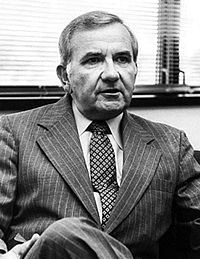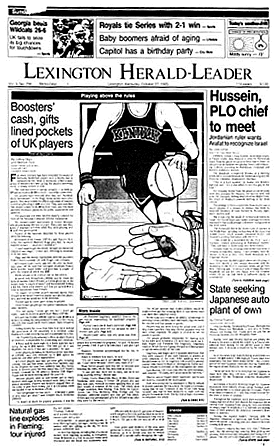Creed Black, Lexington Herald-Leader
By John S. Carroll Los Angeles Times
Now I will submit to you that when it comes to worship of college athletics, no state is more depraved than Kentucky. Although you could make an argument for Alabama. To people in Kentucky, the wins and losses of the Wildcats are personal successes and failures and it’s impossible to overstate the visceral bond between the team and the people.
Well, in 1985 it happened. Two reporters, Jeff Marx 
As a young editor, I turned to my publisher. I was observing not only what he advised me to do, but the manner in which he advised it. Without any apparent soul-searching, he simply said pursue the story, and if you can verify it, let’s publish it. It being a simple matter. Well, we did that. And the result was one of the biggest nightmares a publisher can have. More or less in order, these are the things that happened after this story was published:
- A circulation boycott.
- Advertising boycott.
- A public rally at which the angry speakers attacked the newspaper and hawkers sold caps and t-shirts and bumper stickers denouncing the Herald-Leader.
- A bomb threat that forced us to empty the building while the fire department using dogs searched the place.
- A rifle shot fired into the pressroom.
- Innumerable personal confrontations, such as the subscriber who lay in wait for his delivery man and pursued him down the block with an ax handle.
- Attacks by the electronic media.
Now, I don’t like the use of the word media to describe a variety of news outlets. But in this case, the radio and television stations spoke as one. Station executives who had never been on television before took to the air to denounce the paper’s treachery. One radio station that had a talk show on weeknights attacked the newspaper for nearly 90 consecutive nights. And not one radio or television station ever broadcast any serious consideration that what the newspaper said might have been true or significant.
During all this, no only did Creed not waiver, he actually seemed happy. He wrote a column saying that as a native Kentuckian, he expected the furor, but nevertheless he was disappointed.
As Creed’s editor, I will never forget his steadfastness in the face of this difficulty. And it extended far beyond the newsroom. During the difficult period, I had any number of visits from people in the circulation department or the production department or the advertising department saying that they understood why the newspaper had to publish the story and that they were proud that it did. That is a measure of Creed’s communication and leadership of the whole company.

Now such stories as that that occurred in Lexington are fairly commonplace. A couple of notable examples in recent years are Syracuse, NY and St. Paul, Minn.
In the case of Lexington, it produced what I consider an instructional footnote – if you’d been in Lexington in 1985 when Creed was leading the Herald-Leader, you would have thought that the relationship between the newspaper and the community was broken beyond repair. But in fact, the opposite was true. If you look at the whole decade of the 1980s, which spans this story neatly -- the story appeared in 1985 -- you’ll see that Sunday circulation went up by more than 60%. Daily circulation went up by nearly 30%, in spite of the fact that we’d killed the evening paper. The Herald-Leader made so much money that Knight Ridder would often send promising young executives to Lexington to see how it was done.
The lesson from this experience with Creed Black, as I interpret it, is that people don’t buy newspapers because the newspaper coddles them or because it seeks their permission before it runs a story, or because it panders to their prejudices. They buy it because it tells them important things without flinching, or shading the truth.
Those of us who were in Lexington in 1985 under the leadership of Creed Black never forget what the paper did, how the community exploded, how our publisher held firm. It is a privilege, therefore, 15 years after the fact to express this public word of gratitude to my old publisher, Creed Black
This was a "leadership moment" presented at the ASNE Convention April 3, 2001, at the J.W. Marriott Hotel in Washington, D.C.
